Table of Contents
- Chapter 1Warning Signs Your Child Might Have a Problem
- Chapter 2Talking with Your Child About His or Her Use
- Chapter 3Keeping a Watchful Eye
- Chapter 4If Your Child Needs Treatment
- Chapter 5Helping Your Child Recover
- Chapter 6Taking Care of Yourself
- Chapter 7Never Give Up Hope

Because you’re reading this, you’ve probably noticed one or more signs that your child might be drinking too much or using dangerous drugs. Before we go any further, I’d like to say that I’m deeply sorry you find yourself in this position.
Hopefully, your child’s alcohol or drug use is not a big problem. However, if you’re worried that your child may have a problem with drugs or alcohol, there’s a good chance your suspicions are correct. While there are undoubtedly parents who worry unnecessarily, far more parents are clueless about how much and how often their kids are getting drunk or high. In fact, it took every one of the parents I interviewed for this eBook at least two years to recognize that drugs or alcohol were behind his or her child’s troubling behavior.
Perhaps your son really is only experimenting or your daughter told you the truth when she said the drugs in her bedroom were someone else’s. For your sake, I sincerely hope this is true. But you should be aware that being a good kid from a loving family is no protection against your child falling hard and fast into the agony of addiction, and there are far too many heartbreaking stories of parents who ignored the signs of a child in trouble until it was too late.
We came close to losing our beloved daughter many times during six hellish years as her addiction led her to repeatedly guzzle lethal levels of alcohol. We are exceedingly blessed that she was finally able to stop drinking 2½ years ago and has completely turned her life around. But what I remember so clearly about those years is the overwhelming fear I felt and the horrible realization that I had no idea how to help her. I created this eBook to share some of the things I and other parents have learned as we battled this awful disease.
No matter how bad things seem today, don’t lose hope -- it is possible for your child to overcome even the most serious addiction. Hopefully you will find this information as well as Conquer Addiction’s database of the best treatment centers helpful in winning this fight.
Warning Signs Your Child Might Have a Problem

One of the most challenging things for many parents is recognizing that your child may be abusing drugs or alcohol. Sometimes the warning signs are fairly obvious – your child comes home drunk or high, or you’ve found drug paraphernalia in his room.
For many parents, however, the signs that your child may be in trouble aren’t as clear. My husband and I spent several years concerned that our daughter was drinking too much, but in denial as to how serious the problem was. Partly this was because we had no idea how much she was drinking and drugging, but another factor was that we had no idea what we could do about it.
Many parents explain away the early signs of drug or alcohol problems by thinking it is just typical teenage behavior. And, yes, if your son or daughter is being argumentative and distancing themselves from you, it could mean nothing. However, major changes in interests, behavior, friends and appearance are likely to be a symptom of a deeper problem. Here are some of the most common indicators of alcohol or drug abuse:
- Changes in appetite, sleep patterns or general health: Both sudden weight loss and weight gain can accompany heavy drug or alcohol use, as can a new and unexplained chronic cough. Frequent nosebleeds could be related to snorting meth or cocaine. Nodding off is a common side effect of prescription opioid or heroin use.
- Changes in interests and friends: Has your child stopped playing a sport she loved or lost interest in a hobby or activity that used to engross her? Have the friends she’s hanging around with changed dramatically? Has she withdrawn from family relationships she used to value? Any of these can indicate escalating drug or alcohol use.
- Major drop in academic performance: If your child’s grades have suddenly plummeted, this can be a sign that he is skipping class or has lost his ability to focus on his school work.
- Changes in appearance: A sharp decline in personal grooming, bloodshot or glassy eyes, or pupils that are smaller or larger than normal should all be cause for alarm.
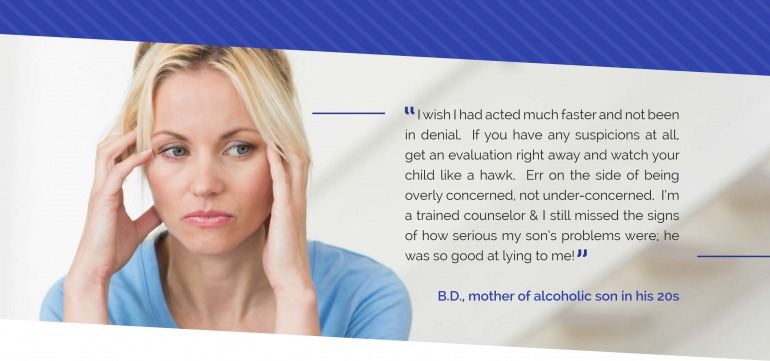
- Acting strange: Sudden personality or mood changes, extreme emotional highs and lows, hyperactive or lethargic behavior, incoherent or slurred speech, sudden coordination issues, and shakes, tremors or seizures are strong indicators that something is wrong.
- Suspicious behavior: Is your daughter engaging in secretive or suspicious behavior, such as locking doors and avoiding eye contact? Is she staying out much later than normal or sneaking out of the house?
- Unusual smells: Do you sometimes notice strange smells on your child, his clothes, or in his room? Is he using incense, perfume or air freshener to hide the smell of smoke or drugs?
- Missing money, valuables or prescription drugs: Most teenagers start using opiates by raiding their parent’s or a friend’s parent’s medicine cabinet. Once their drug or alcohol use expands beyond what they can get for free, some kids start stealing to support their habit.
If more than one of these indicators applies to your son or daughter, please don’t ignore the problem. Drug and alcohol abuse kills. In the United States, 368 people die from alcohol or drug abuse every day.
You know your child better than anyone. Please trust your instincts about whether he or she is in trouble.
Talking with Your Child About His or Her Use

There are several common factors that may be holding you back from talking to your child about your concerns:
- You may already be tense and exhausted from dealing with a teenager or young adult who’s breaking a lot of rules; the last thing you want to do is to initiate another confrontation.
- While you have suspicions, you don’t have proof that they’re drinking or using drugs in a dangerous fashion.
- You’re overwhelmed with fear and have no idea what to do if your suspicions are confirmed.
- It’s easier not to know.
Don’t let any of these excuses stop you from holding a frank conversation with your child. You need to know what’s going on and they need to know you care.
Do your homework
Prepare for your conversation by doing the following:
- Put together a list of things you’ve observed that concern you. The more specific you can be (for example, by saying “your eyes were bloodshot when you came home Friday night and you weren’t making any sense”), the harder it will be for your child to simply blow you off.
- Talk to your spouse and any other parents or stepparents about your concerns. Do your best to present a united front.
- Consider talking to some of the parents of your child’s close friends to compare notes and see if they share your concerns. If nothing else, raising the topic could lead to a higher level of oversight of what the kids are doing.
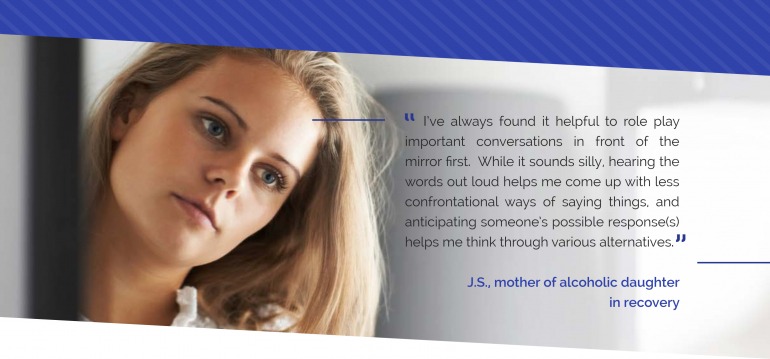
- Educate yourself about the signs of drug and alcohol abuse and what kids in your community are doing for kicks, perhaps by talking to a school guidance counselor, sports coach or youth group leader.
- Think through the best way to approach the conversation and what you’d like its outcome to be.
The first conversation
Find a good time to hold a calm, loving conversation with your child. Think carefully about where and when you want to start it, but don’t put it off for more than a few days. Don’t attempt to talk to your child when she is drunk or high or when you’re angry. If you think your child might just stomp off when she realizes you want to talk about her drinking or drug use, you might choose to have the conversation someplace she can’t easily leave, such as while driving somewhere in the car or in her room.
This first conversation may not be a long one, but it’s important you do the following:
- Openly and honestly share your concerns.
- Listen carefully to your child’s responses.
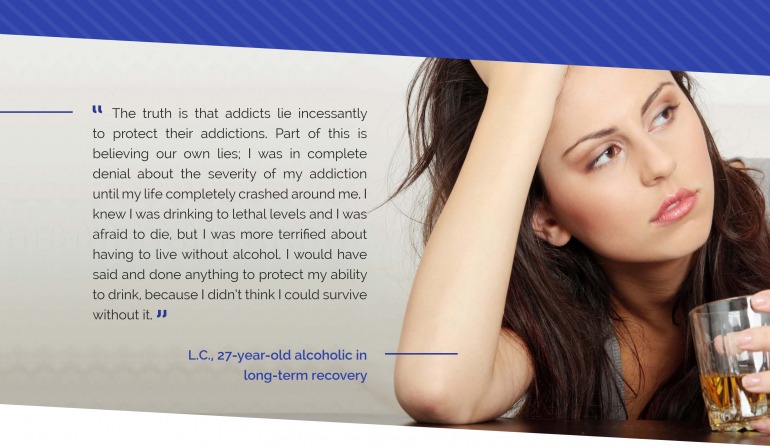
- Let them know how dangerous drinking and drugs can be and that you’re here to help.
- Be open about any history of addiction in the family. Let them know if they’re likely to have a genetic predisposition for addiction.
- React calmly and lovingly, even if they confirm your worst fears.
- Do your best to agree on some next steps.
The most likely outcome is that your child will turn himself inside out trying to convince you there’s nothing to worry about. Listen carefully and take this with a grain of salt.
Possible action steps
Assuming that this first conversation does not raise any major red flags, you could use this time to agree on some action steps designed to help keep your child safe, such as:
- Car accidents are the #1 cause of death for teenagers, and many fatal accidents are alcohol-or drug-related. Ask your child to call you if he’s considering driving after drinking or using drugs or if he realizes that whoever is driving him somewhere is not completely sober. Assure him you’ll reward his maturity by not getting mad or using it against him in any way.
- Agree on a code word that means “Come get me. Don’t break my cover, but I’m in a dangerous situation and I need your help”. Agree that your child will not get in trouble for calling you regardless of where or with whom she’s with and that your child can pretend to be as mad as she wants in front of her friends.
- Tell your child that you will be confirming all late nights and overnights with the adult in charge.
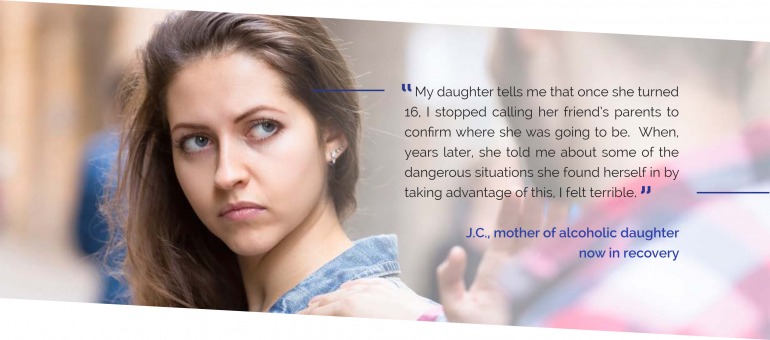
- Create a contract between you and your child where you each write out what you expect from each other and, possibly, consequences for breaking the contract.
Keeping a Watchful Eye

Unless it is already clear that your child is struggling with serious addiction issues, the likelihood is that these early conversations will be followed by a period of watching and waiting. Don’t dwell on the problem, but don’t let your guard down either.
Some other important things to do include:
- Set and enforce rules: If you haven’t already, it’s important to set appropriate rules (e.g., you’ll be home by midnight or I’ll come get you) and hold your child to them. Make sure to carry through on the consequences you’ve set when a rule is broken.
- Wait up for your child to return home: Knowing that her parents will notice if she comes home drunk or high may be incentive enough to keep your daughter from binge drinking or taking drugs at a party.
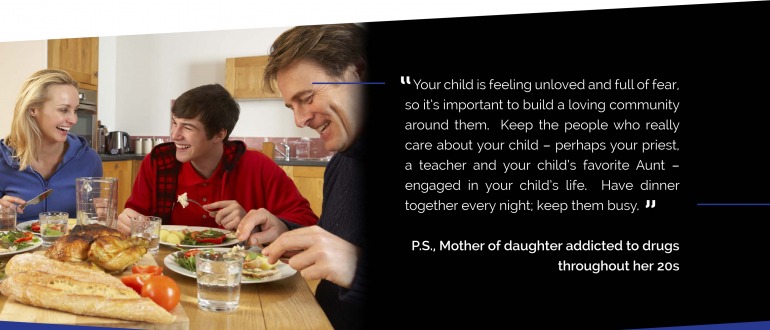
- Don’t enable your child’s drinking or drug use: If you’re convinced that your child is drinking or using drugs, think about any ways you could be inadvertently helping him do so. Do you give him a large weekly allowance that he could be using to buy drugs? Could he be using the car you’re providing to hook up with his dealer or sell drugs himself?
- Lock up the liquor cabinet and get rid of old prescription pills: Many kids start experimenting with prescription pills like OxyContin by raiding the family’s medicine cabinet.
- Keep a sharp eye out for signs that your child’s drinking or drug use is getting worse: Use your common sense, and don’t accept cockamamie stories your child tells you.
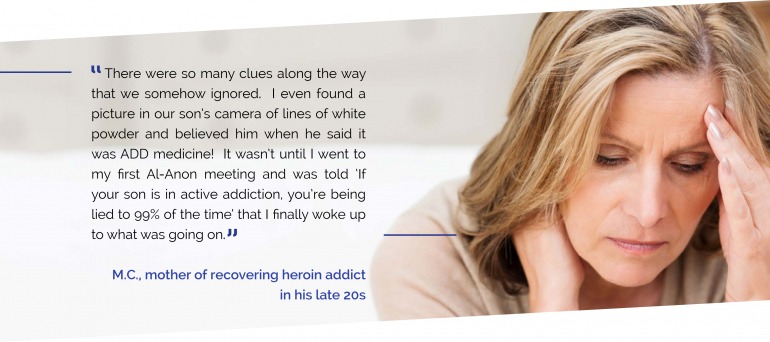
In addition to these noncontroversial actions, some parents are comfortable more aggressively monitoring their child’s whereabouts or searching for evidence of their child’s drug use. Actions you can consider include:
- Drug testing: If you’re willing to pay for it yourself, many testing labs will allow you to bring in your son or daughter for a urine drug screen. If the lab will not do the testing without a doctor’s prescription, consider sharing your concerns with your family doctor. While not as accurate, you can also purchase drug testing cups or breathalyzers and do the testing yourself. Beware, though, that the Internet is full of information about how to fool drug tests by sneaking in clean or synthetic urine or by adding chemicals to the sample.
- Snooping: If you are comfortable searching your child’s things for drugs or alcohol, good places to look include backpacks, dresser drawers, the glove compartment of the car, make-up cases, under the bed or mattress, in the bottom compartment of push-up deodorant, or the closet.
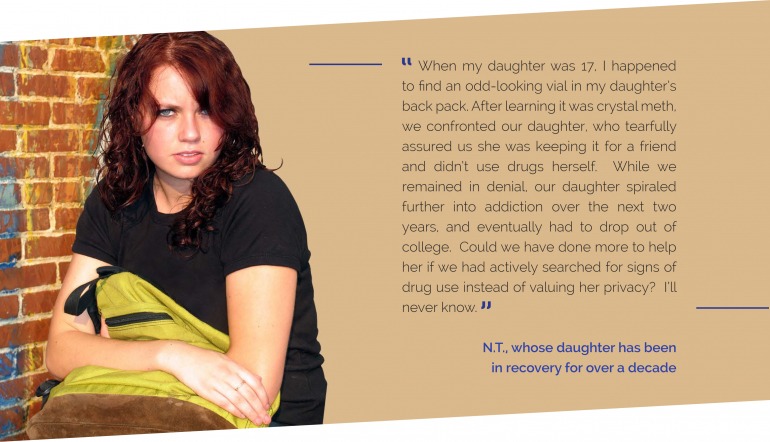
- Tracking your child’s phone: Apps exist that allow you to track where your child is, who they’re calling and what they’re texting.
Build a team of advisors
If it appears that your child’s problems with drugs or alcohol are getting worse, you should start building a small team of advisors whose advice you trust. Unfortunately, you may find this surprisingly difficult to do. Places you might start include:
- Your child’s doctor: While he or she may know your child fairly well, the sad truth is that very few general practitioners or family physicians have received even cursory training in addiction.
- Counselors & therapists: Just because someone is a licensed clinical social worker or therapist does not mean he is an expert in addiction. In fact, he may have received surprisingly little training in the field; beware of advice that doesn’t feel right.
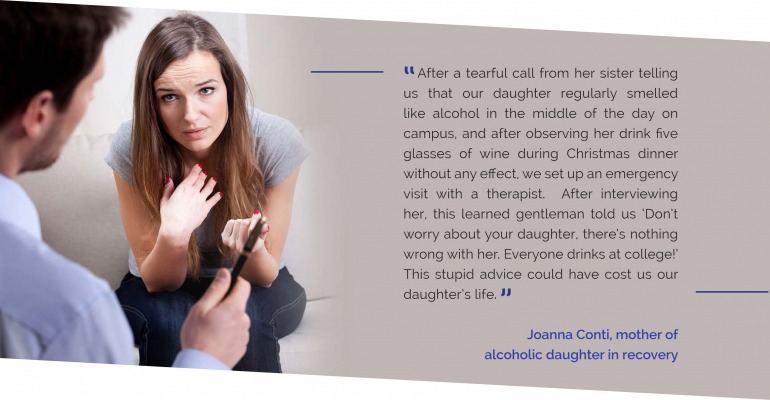
- Parents Groups: Talking to other parents whose kids are also struggling with drugs or alcohol can be extremely helpful. Because they know what you’re going through, they can provide a sounding board as well as recommend advisors and treatment programs they’ve found helpful. Visit Resources for Parents and Family Members for a list of parent support groups that other parents have recommended.
- Substance abuse counselors & specialists: In the absence of a recommendation from someone you trust, you can search for a substance abuse counselor or specialist through Healthgrades.com (enter “substance abuse counseling” as the specialty), the directory of the Association for Addiction Professionals (NAADAC), or by Googling “addiction counselor” along with the name of your city. However, don’t start working with someone without investigating their background. Almost anyone can call herself an addiction counselor; 14 states don’t require any sort of license or certification, and 6 states don’t even require counselors to have a high school diploma! Most people in this field have the experience that comes from being in recovery themselves, but may have little formal training.
- Physicians and Psychiatrists Specially-Trained in Addiction: Especially if you believe your child may have underlying physical or mental issues that could be contributing to his drug or alcohol use, you should reach out to a medical professional who has extensive training in addiction. To find a nearby doctor who has been Board certified as an addiction expert, select “Find a Doctor/Specialist” on the websites of ABAM (American Board of Addiction Medicine) or AAAP (American Academy of Addiction Psychiatry).
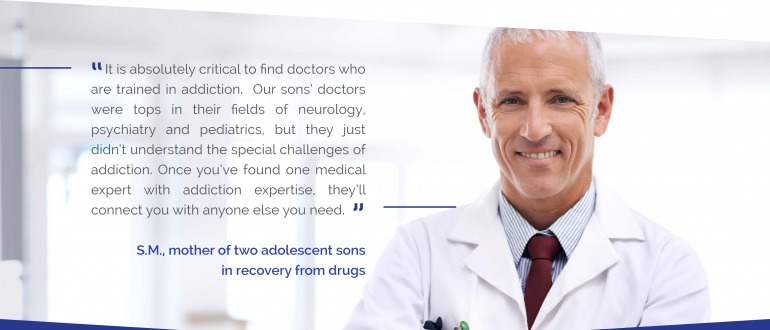
If Your Child Needs Treatment

Addiction is a progressive disease. If your child heads far down this slippery path, there will almost certainly come a time when the life-and-death stakes make action necessary. For many parents, a car accident, DUI, drug overdose, alcohol poisoning incident or shocking phone call may make the extent of your child’s addiction abundantly clear. In other cases, the evidence that your child is in serious trouble may simply become so overwhelming that you can no longer deny it.
One opinion you may hear is that someone has to hit bottom in order to become and remain sober. There are two problems with this common belief. First, it is impossible to know except in retrospect whether someone has hit bottom and, second, believing that things can’t get worse is a failure of the imagination. No matter how bad things are today, they can always get worse tomorrow. Don’t risk your child’s death by waiting for him to hit some hypothetical bottom.
Convincing your child to go to treatment
Your job will be easier if your child accepts the necessity of treatment and joins with you to select the right treatment program. While this is clearly a desirable outcome, this will probably only occur if one or more devastating things have recently happened that strip away her argument that nothing is wrong.
A more common situation is for your child to fight wholeheartedly against treatment, swearing that she’s doing fine and begging to be left alone.
If your child is under 18, you can force him into treatment against his will in most states. However, since his motivation to get sober is an important factor in his eventual success, convincing your loved one to agree to treatment is always a better approach.
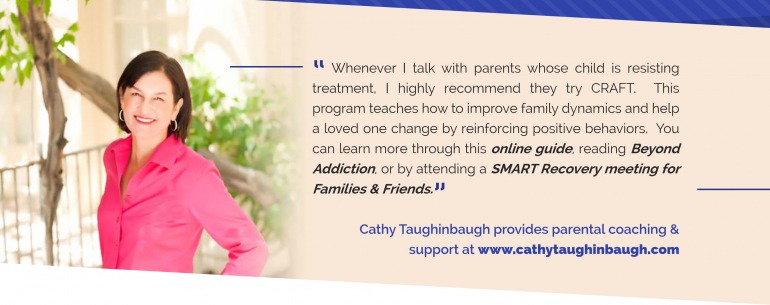
If you watch much daytime TV, you have probably seen dramatic depictions of substance abuse interventions. In an intervention, the interventionist and loved ones confront an addict with powerful evidence of the problems drugs or alcohol are causing him and a plan for what the family is going to do if he doesn’t agree to go to treatment. If the addict eventually accepts the need for treatment, the interventionist transports him immediately to the treatment center that has agreed to accept him.
If you believe your child needs such an approach, you can find interventionists by Googling “interventionist” and the name of your state. Because there are some unethical practitioners who receive kickbacks from treatment centers for referring patients, you should make sure that your interventionist has agreed to be bound by standards through the IICB or a similar organization that prohibit him or her from receiving a fee or other compensation for the referral of clients.
While data on the number of formal interventions does not exist, they’re not as common as you may think. Most families are able to convince their child to enter treatment more informally.
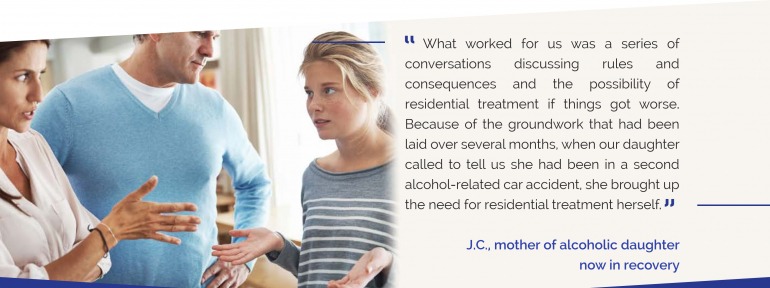
If they refuse treatment
Regardless of your approach, your son or daughter may refuse to go to treatment. In this case, you should be prepared to follow through on any consequences you established earlier. If you’ve told your adult child that they can’t continue to use drugs while they’re living in your house, for example, you need to kick them out.
These tough love decisions are terrifying due to the risks involved, and should not be made lightly or without professional support. However, continuing to enable your child to abuse drugs or alcohol by negating the natural consequences of his or her use is not helpful either.
David Sheff talks about how horrible it was to refuse his beloved son’s frantic request to pick him up off the streets and let him sleep off his latest drug binge at home. But David had been down this road many times before and knew that Nic’s promises to go into treatment would be forgotten by morning. After his son refused his counteroffer to pick him up and take him directly to treatment, David hung up the phone and cried in terror that he would never see his son again.
The next time Nic contacted David, he was ready to enter treatment. But, as he recounts in his excellent book Clean, David is still not sure that this tough love approach was the right choice.
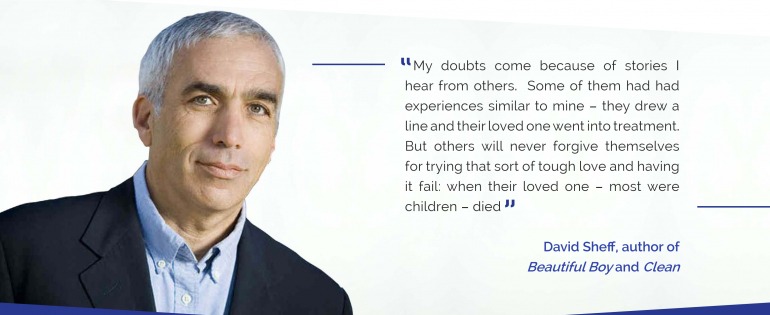
Finding the right treatment program
There are about 14,000 treatment centers in the U.S., and new ones are opening every day. How do you find the right one for your child?
The first thing you need to do is determine what type of addiction treatment to choose. Working with an addiction specialist to do this is highly recommended as the success you can expect for a particular type of treatment varies according to the severity of the addiction and the individual’s motivation to succeed. There are four primary types of treatment:
- Residential Treatment: Well-run residential programs will provide a variety of one-on-one counseling, group therapy and 12-step meetings in a structured setting removed from the people, places and things your child associates with using. These live-in programs typically last between 28 and 90 days. In some states, residential treatment programs are referred to as Partial Hospitalization Programs/Intensive Outpatient Programs (PHP/IOP).
- Intensive Outpatient Treatment (IOP): IOP programs typically meet two or three days a week for 2-4 hours at a time for group counseling. Some people recommend trying Intensive Outpatient Treatment before Residential Treatment to see if this much lower-cost option is sufficient for your child. The risk, however, is if your child continues to use while attending IOP, his addiction could worsen and he could potentially overdose.
- Counseling: Individual or group counseling is designed to identify the root causes of one’s addictive behavior and learn better coping skills. One-on-one counseling can be particularly helpful if your child is also struggling with mental health issues or trauma. Counseling alone may be effective for highly-motivated people in the early stages of addiction, but is probably best used in conjunction with either IOP or residential treatment for those with more severe addiction issues.

- Detox: Detox facilities help an addict safely wean herself off of alcohol or drugs by providing medical oversight and, potentially, medication to lessen the agony of withdrawal. Patients usually stay at the detox facility for 4 to 7 days until the worst of the withdrawal symptoms have subsided and the likelihood of a medical emergency has passed.
Alcoholics Anonymous (AA) & Similar 12-Step Groups: While AA has helped millions of people over the years become sober, it is a support group, not a treatment program. Unless your child is highly motivated to become and remain sober, you should probably encourage heavy 12-step involvement as part of recovery, but not expect it to work by itself.
Meaningful Accreditations & Success Rates: Because the addiction treatment field is largely unregulated, the effectiveness of various treatment programs ranges from phenomenal to truly awful. Just because a center has a beautiful website or appears at the top of an online directory of treatment programs means nothing; many web sites that appear to be unbiased referral sources receive referral fees from the centers they recommend.
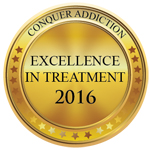
At Conquer Addiction, we believe the best indicator of a quality program is whether a solid percentage of its clients are clean and sober one year after treatment. Unfortunately, very few treatment centers conduct scientific followup monitoring of their clients and report the results. We reward those who report strong long-term sobriety success rates with our Excellence in Treatment award. We also show these programs at the top of all relevant searches on our online searchable database of some of the best treatment centers. Conquer Addiction does not receive any compensation from treatment centers for referrals.
Another thing to look for is whether the center is accredited by either the Joint Commission on Accreditation of Healthcare Organizations (JCAHO) or the Commission for the Accreditation of Rehabilitation Facilities (CARF). If a center does not have either of these accreditations, it should at least be accredited by its state.
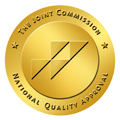
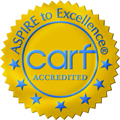
Special Programs: Another important factor to consider is whether there might be other mental health issues or secondary addictions that need to be treated in addition to drug or alcohol abuse.
The National Institute on Drug Abuse claims that people addicted to drugs are roughly twice as likely to suffer from mood or anxiety disorders as the general population. If you think your child may be suffering from depression, schizophrenia, severe anxiety or other mental illness, look for a treatment program that has specialists on staff trained to treat such co-occurring or dual diagnosis disorders in addition to addiction.
A second factor you should consider is whether your child could be suffering from unresolved trauma she needs help processing.
Almost one in five women have been the victim of rape or attempted rape in their lifetimes and frequent, heavy drinking increases women’s chances of experiencing rape in college eight-fold. As a result, addiction and trauma disorders are closely linked, particularly among women. If this applies to your child, look for a program whose clinicians are experienced in treating trauma.
It is estimated that one in every 200 American girls between the ages of 13 and 19 cut themselves regularly. If there are signs that your child may be harming herself, look for treatment programs with expertise treating “process addictions”.
Finally, if your child has a serious eating disorder, you should search for a treatment program that specializes in treating this life-threatening condition.
Searching the Conquer Addiction Rehab Review Site: To search for a treatment program, go to www.conquer-addiction.org/rehab-reviews and enter your most important criteria. If you want to find a residential treatment program in the Northeast that treats adolescents with co-occurring disorders, for example, the Caron Foundation will come out on top. They’ve been tracking their outcomes for 10 years, and 32% of their clients report they have abstained from all drugs and alcohol for at least one year after treatment.
Paying for treatment
Most private residential treatment programs cost at least $30,000 for a 28-day stay, and some charge substantially more than this. How can an average family afford good treatment?
The first thing to do is to study your health insurance policy. Some rehabs have solid relationships with particular insurance companies and can often get at least some of the treatment cost covered.
But beware. Even though the Affordable Care Act guarantees that treatment for mental health and substance abuse diseases will be covered similarly to medical problems, few health insurance companies are paying for private residential treatment programs in full. If they cover a particular center at all, they may only pre-approve 7 or 10 days of residential treatment, requiring the center to reapply every day or two after that for continuing coverage.
If your insurance isn’t going to cover the full cost of treatment, ask the admissions counselor if they offer a sliding scale based on income or if your child could qualify for any partial or full scholarships.
Another alternative is to consider state-funded treatment programs, which are typically substantially less expensive than the private treatment programs.; Unfortunately, they also tend to have long waiting lists.
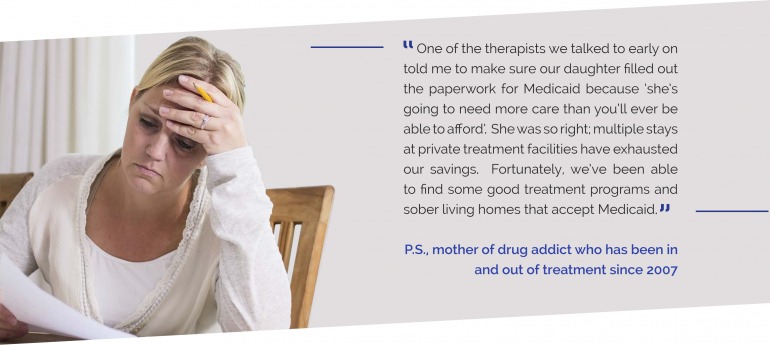
Other unpalatable funding options are to raid your retirement or college funding accounts or to take out a loan to cover a child’s residential treatment. Finally, of course, you can limit yourself to less-expensive outpatient programs or free 12-step meetings.
Helping Your Child Recover

Once your son or daughter has enrolled in an appropriate treatment program, take a moment to breathe a big sigh of relief and then get back to work.
Kicking his drug or alcohol habit is likely to be the hardest thing your child has ever had to do. Let him know how much you love him, how proud you are of what he’s doing, and make yourself available to support him in any way you can.
If his treatment program offers a family program, participate wholeheartedly and be open to changing any family dynamics that may be contributing to your child’s addictive behavior.
Most importantly, start working with your child’s counselor to find appropriate after-care options for when your child finishes residential treatment.
Treatment is simply the first step in achieving long-term sobriety. Residential treatment centers should provide a safe and therapeutic environment for your child to detox and help motivate her to pursue a sober lifestyle, but eventually the time will come when she needs to leave treatment and start living life. This can be an extremely vulnerable and dangerous time.
Addiction is a chronic disease that changes how the brain functions. Unfortunately, one of the most common symptoms of an addicted brain is extraordinarily strong cravings. As a result, the rate of relapse after treatment is depressingly high, and it often happens very quickly.
Three factors can contribute substantially to a successful recovery:
- Starting Over in a New Environment: Cravings are often intensified or triggered by things that remind your child of getting drunk or high, such as friends he used to party with, the road he took to his dealers’ house, or the liquor store he stopped at on the way home from work. If possible, it is almost always advisable for your child to start over in a new location where he won’t be tempted by past routines and will have the opportunity to make new friends, create new memories, and build an entirely new life for himself based in recovery.
Living in a well-run sober living home with ongoing monitoring, oversight by experienced counselors, and required 12-step meetings could dramatically improve your child’s odds of staying sober. If a sober living environment is not an option, it will be even more important to impose structure in your child’s life. She should continue to get up at a respectable time, attend counseling or 12-step meetings daily, and get her feet back on the ground by finding a low-stress job or enrolling in one or two classes at the local community college.
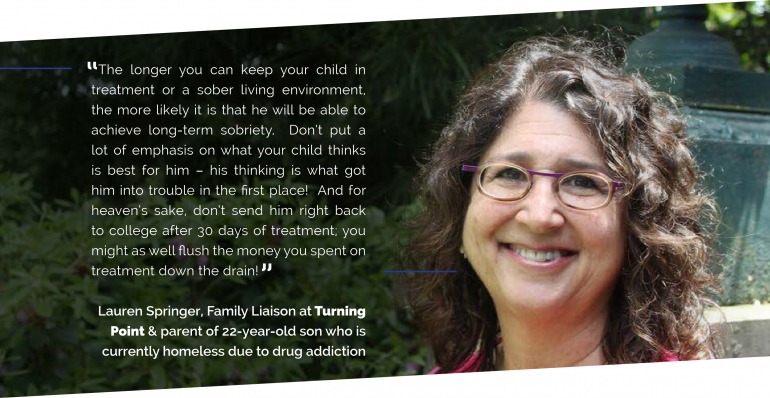
- Attending 12-Step Meetings and Working the Steps: Unfortunately, simply starting over is unlikely to keep your child sober for long. Regardless of how badly she wants to stay sober, your child needs an intensive support system to help her avoid picking up that first drink or calling her dealer when cravings hit.
Alcoholics Anonymous and similar 12-step programs like Narcotics Anonymous have been providing a proven path to recovery for more than 80 years & are highly recommended. However, if your child is turned off by the 12-step approach, other options include SMART Recovery, Women for Sobriety, Refuge Recovery, or regularly seeing a counselor or Recovery Coach for support.
Common AA recommendations for people new to sobriety include:
- Find a sponsor or temporary sponsor as soon as possible
- Call your sponsor every day
- Attend 90 meetings in the first 90 days after treatment
- Reach out to at least three other people in recovery every day
- Work the 12 steps sequentially with the guidance of a trusted sponsor
- Help someone else every day in some way
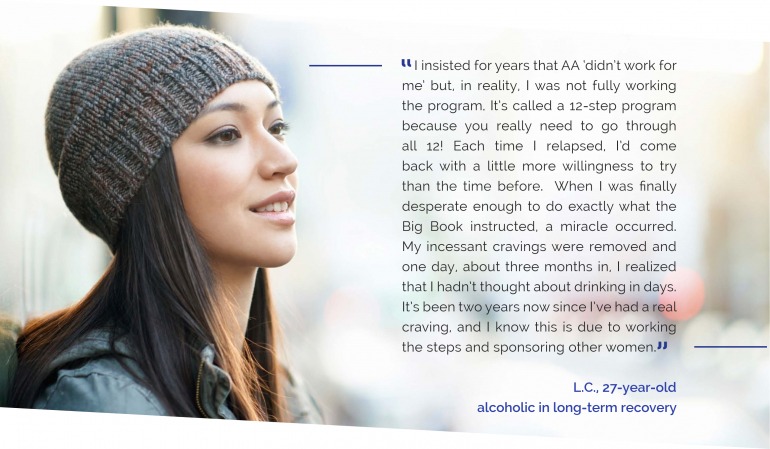
- Setting Up a Monitoring Program to Help Your Child Stay Sober: Monitoring programs can be quite effective at helping people maintain their sobriety. Some of the more progressive treatment centers offer weekly or bimonthly counseling calls, online check-in programs and periodic urine testing to increase the odds their clients can stay sober long-term. If your center does not offer a monitoring program, consider contracting with a local laboratory to schedule random drug or alcohol tests, investing in a breathalyzer such as SoberLink, or purchasing your own five-panel drug tests at the local pharmacy.
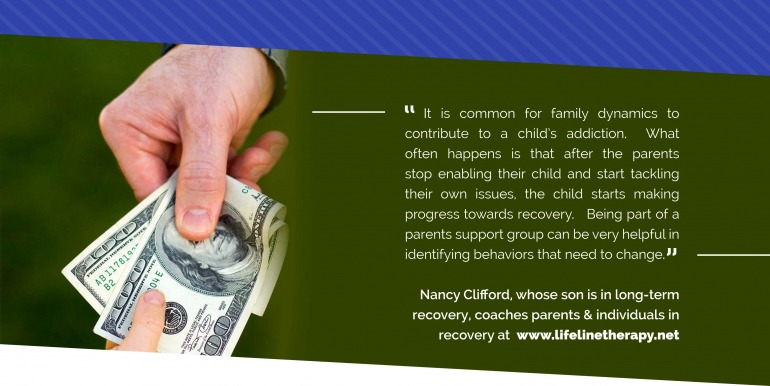
Supporting without enabling
For many parents, navigating the line between supporting your child and enabling his addiction is difficult. Enablers facilitate and sustain their loved ones’ addiction by removing the natural consequences of their actions. Enabling can take many forms, from financially supporting the habit to making excuses for your child’s unpredictable behaviors. The end result of all enabling is the same: there is little motivation to change, and the addiction often gets worse.
These examples might help you see where to draw the line:
- Financial: Paying for your child to go to treatment is an investment in his recovery and is one of the strongest ways you can provide support in the tumultuous early days of sobriety. Sober living houses are also an important tool that can help your child get on his feet. On the other hand, paying for him to return to college right away or giving him a large amount of spending money is enabling his old behaviors and possibly setting him up for relapse.
- Behavioral: Your child needs to make recovery her number one priority in early sobriety, but this does not mean an all-expenses-paid vacation from responsibility. She should be working at least part-time and contributing to her rent payments. You want to provide support so your child can make it to meetings and focus on her recovery, but too much free time is actually dangerous. Also consider withholding certain privileges, such as the car, to be earned back over time.
Taking Care of Yourself

From the moment each of our children were born, we’ve done everything in our power to protect them and keep them safe. The agony of being forced to watch a child self-destruct is beyond comprehension.

As impossible as it seems to do so, parents must learn to detach from the constant turmoil and take care of ourselves. Otherwise, we won’t be able to respond appropriately when our child becomes open to pursuing recovery.
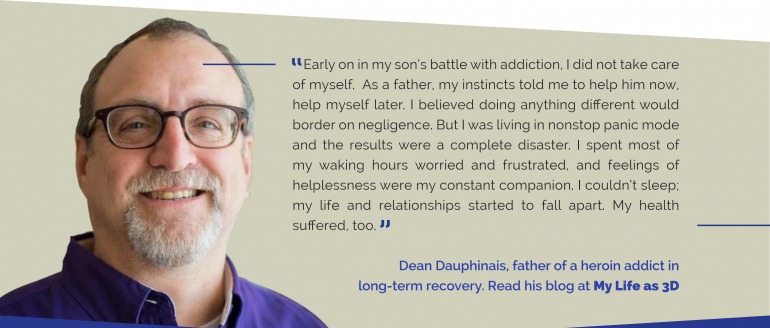
Parent support groups
One of the things that almost every parent we’ve interviewed for this eBook has recommended is that parents of children battling alcohol or drug addiction meet regularly with a supportive group of other parents sharing the same struggle.
The best known of these groups are Al-Anon and Nar-Anon, which have helped countless people over the years deal with the chaos of a loved one’s addiction. However, because their mission is to help you take care of yourself while living with a loved one’s addiction, you may be told it is inappropriate to ask for advice on how to help your child during a meeting.
Parents who are actively searching for ways to help their children may get more support in meetings run by other organizations. You can google “addiction parent support group” plus the name of your city to find appropriate groups.
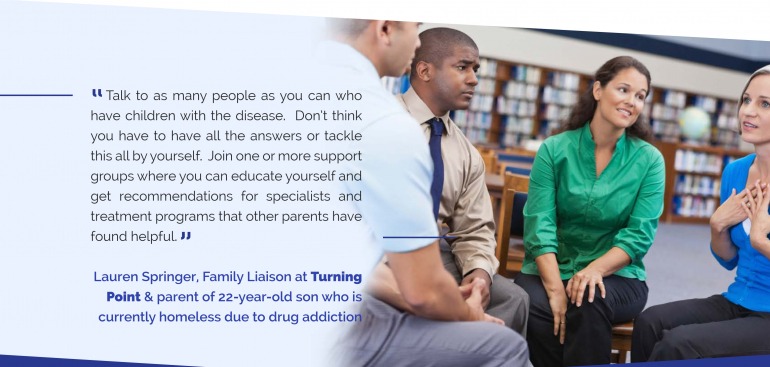
Never Give Up Hope
As a parent of a child battling drug or alcohol addiction, you’ve become a member of a group none of us ever dreamed we would have to join.
While the path ahead may be scary and hard, please don’t ever give up hope. Many of us who’ve been where you are now have children who’ve successfully beaten the odds and become loving and successful adults in long-term recovery.
We hope you find our research-informed articles and the searchable database of treatment centers on the Conquer Addiction website to be helpful.



